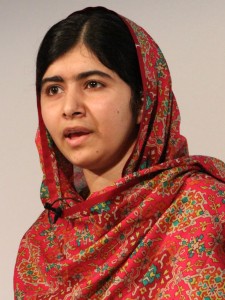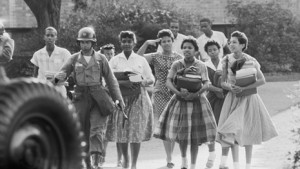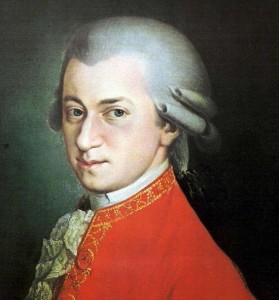You can say the same. I can say the same of myself. On our own, we are only one. However, if we each do what we can to make the world a better place, what could we accomplish?
By now, I imagine everyone knows Malala Yousafzai’s story. As a young girl, she defied the Taliban in her native country of Pakistan by attending school and demanding that all girls be afforded the same educational opportunities as boys.

Photo by Russell Watkins/Department for International Development. – https://www.flickr.com/photos/dfid/14714344864/
At only 11 years old, she gave a speech in Pakistan, “How dare the Taliban take away my basic right to education?” When she was 12, she began blogging about her experiences.
She continued to speak out even after the Taliban shot and nearly killed her. For her courage and “struggle against the suppression of children and young people and for the right of all children to education,” she was a co-recipient of the 2014 Nobel Peace Prize.
How many of us face literal threats of death for speaking our minds? I know that I am sometimes afraid to speak my mind when all I have to fear is a lost friendship. Where did Malala—where does anyone—summon the courage to speak out in the face of death?
That question sent me on a search for other extraordinary young woman who made a difference at pivotal moments of history. I came across the website for the National Women’s History Museum, an organization honoring the achievements of American women. Currently, the museum has only an online presence. Its goal is to build a brick-and-mortar building in Washington, DC.
Among its many virtual exhibits about women is “Young and Brave: Girls Changing History.” I had never heard of many of these extraordinary young women. The story that stood out for me concerns the so-called Little Rock Nine. In 1957, these six brave girls and three brave boys also risked their lives for the opportunity to go to school.
In the mid-twentieth century, the United States was very much a segregated society. White children and black children attended separate schools. Despite a Supreme Court decision declaring “separate but equal” education unconstitutional, many states balked at integrating their schools. The schools in the State of Arkansas became a flashpoint for the issue when President Dwight Eisenhower called out federal troops to force Little Rock Central High School to admit the nine young black students. The students endured daily verbal and physical attacks. One of the Little Rock Nine students—Minnijean Brown—was expelled because she retaliated against the white students who taunted her.
Yet Minnijean Brown—today Minnijean Brown-Trickey—ultimately received the education she craved, graduating from high school and college. She’s been a teacher, the deputy assistant secretary for workforce diversity at the Department of the Interior, and a tireless advocate for youth leadership and social justice.
Fittingly, Ms. Brown-Trickey also was one of the invited guests to attend the ceremony at which Malala received the Liberty Medal in Philadelphia on October 21, 2014.
Have you ever faced a situation when you had the opportunity to right a wrong? What were the consequences?



